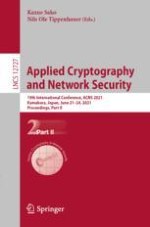2021 | OriginalPaper | Buchkapitel
An Efficient Passive-to-Active Compiler for Honest-Majority MPC over Rings
verfasst von : Mark Abspoel, Anders Dalskov, Daniel Escudero, Ariel Nof
Erschienen in: Applied Cryptography and Network Security
Aktivieren Sie unsere intelligente Suche, um passende Fachinhalte oder Patente zu finden.
Wählen Sie Textabschnitte aus um mit Künstlicher Intelligenz passenden Patente zu finden. powered by
Markieren Sie Textabschnitte, um KI-gestützt weitere passende Inhalte zu finden. powered by
